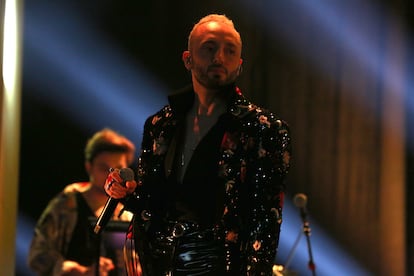Turkish Islamists seeking cultural dominance launch bans on festivals and concerts
Many artists have been cancelled for their LGBTQ+ support or for criticizing the conservative government


In June 2021, Turkish pop singer Gökçe tweeted, “Love whoever you want. Love is love.” Little did she know that this tweet would have long-lasting consequences. This year, she was scheduled to perform at a festival in the small resort town of Sandikli in western Turkey. However, less than two weeks before the August 11 concert, Islamist Mayor Mustafa Çöl cancelled the concert. Posting several screenshots of Gökçe’s supposedly offensive tweets, Çöl said, “We’ll never accept those who attack our sacred values. People who share these things won’t even be allowed to set foot in our region, let alone appear in Sandikli!”
About 20 concerts by major Turkish rock, pop and folk stars, as well as music festivals, have been canceled in the past three months as a result of pressure from government authorities and Islamist groups. Artists have faced backlash for expressing support for LGBTQ+ rights, condemning violence against women, supporting opposition parties and promoting music in minority languages. Similar events occurred last summer and many see these cancellations as an attempt by Turkish Islamists to extend their influence and promote a culture aligned with their ultra-conservative principles during President Recep Tayyip Erdogan’s long tenure in office.
The City Council in Bursa — the fourth-largest city in Turkey — didn’t mince any words when it removed singers Melike Şahin and Hüseyin Turan from the lineup of a municipal festival on June 14. “We cannot ignore these disrespectful comments… We’ll keep moving forward together with artists who truly respect the national will and the values of our society.” Turan’s supposedly “disrespectful” statements on social media expressed support of opposition candidates during the May elections that ended with another victory for Erdogan. “This narrow view of art is a way of silencing artists. But for me, it’s an honor that they actually view my opinions and art as dissension,” said Turan.
Sahin’s offense happened at the Elle Style awards, when she dedicated her award to the struggle “of all my sisters and queers.” At the same ceremony, pop artist Mabel Matiz said he was inspired by “the courageous struggle of LGBTQ+ people in Turkey.” Both statements got them banned by the Denizli City Council from performing two scheduled concerts that were later sponsored by a private company. Meanwhile, Sufi musician Ömer Faruk Belviranli, who went viral two years ago for organizing a performance by a children’s choir to celebrate President Erdogan’s birthday, has just been appointed director general of fine arts at the Ministry of Culture.

“We are facing significant censorship in our country,” said the manager of a well-known Turkish pop star, who wishes to remain anonymous because their client has already been cancelled once for expressing personal opinions. “We have about five concerts every month and must be cautious. We have been warned about what we can and cannot do and say.”
It’s not just about what they say or don’t say, but how live music is experienced. Veteran electronic pop singer Hande Yener was recently barred from a festival in Balikesir due to pressure from Islamist organizations that claimed that pop concerts lead young people to “rebellion” and “immoral relationships.” They called for cultural events without alcohol and strict separation of women and men. Similar reasons led to the cancellation of the long-planned Küzeyfest and Nilüferfest festivals by provincial government authorities in Sinop and Bursa. Attorney Tolga Sirin wrote in an article published by the T24 digital outlet that such actions orchestrated by Islamist factions are unconstitutional in a secular state like Turkey.
“Nobody is forcing them to come to a concert. If they don’t like it, they can stay home. But why prevent other people from coming?” said percussionist Ismail Altunbas, who plays with some of the groups that have been cancelled. “It’s pretty obvious that they want to control how people live, and that really restricts our individual liberties.”
“How sad that we have to talk about banning music in the 21st century!” said folk-rock singer Niyazi Koyuncu, another musician cancelled due to his criticism of the Turkish government. These threats place musicians in a vulnerable position, precisely when they are still striving to recover from the economic downturn caused by the pandemic. The situation has compelled numerous artists to give up music altogether. “I work with a team of 15 people, and whenever there’s a cancellation, it really hits them hard. I mean, it’s not just about losing a gig, it’s about losing their livelihood. They’ve put in all this effort, reserved those dates for the concert, and prepped everything only to find out they won’t get paid,” said Koyuncu. While he respects and understands professionals who choose silence, he advocates for greater unity. “We can’t just stay silent. We’re getting used to all those restrictions way too fast. We must stand up for music and art, because that’s how we protect our freedoms.”
“We have been in power for 14 years without interruption, however, we still face challenges in terms of social and cultural influence,” said Erdogan in 2017. Like other leaders of the authoritarian right, he believes that leftists and liberals dominate the cultural sphere and is determined to put an end to their influence.
“Politically, they have gained significant power. We currently have the most conservative parliament in the history of Turkey, and religious orders have grown influential within the state apparatus. They believe they have the authority to enforce their values on society,” said academic Selim Koru, author of the Kültürkampf newsletter about the interaction between Turkish culture and politics. Koru suggests that the Erdogan government and its allies, including nationalist, far-right and Islamist fundamentalist groups, are dissatisfied with only having the support of half the country. Their goal is to change the cultural roots of the country and de-westernize it in order to establish cultural, social and political dominance. “Their goal is to restrict activities like drinking alcohol, listening to rock music or being gay to the private sphere, as if they should only be done behind closed doors. In other words, they aim to enforce modesty and subtly push people into conforming with their cultural norms by making them feel ashamed of their behavior.”
Sign up for our weekly newsletter to get more English-language news coverage from EL PAÍS USA Edition
Tu suscripción se está usando en otro dispositivo
¿Quieres añadir otro usuario a tu suscripción?
Si continúas leyendo en este dispositivo, no se podrá leer en el otro.
FlechaTu suscripción se está usando en otro dispositivo y solo puedes acceder a EL PAÍS desde un dispositivo a la vez.
Si quieres compartir tu cuenta, cambia tu suscripción a la modalidad Premium, así podrás añadir otro usuario. Cada uno accederá con su propia cuenta de email, lo que os permitirá personalizar vuestra experiencia en EL PAÍS.
¿Tienes una suscripción de empresa? Accede aquí para contratar más cuentas.
En el caso de no saber quién está usando tu cuenta, te recomendamos cambiar tu contraseña aquí.
Si decides continuar compartiendo tu cuenta, este mensaje se mostrará en tu dispositivo y en el de la otra persona que está usando tu cuenta de forma indefinida, afectando a tu experiencia de lectura. Puedes consultar aquí los términos y condiciones de la suscripción digital.








































